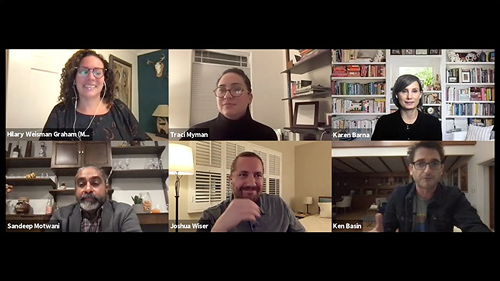
Your Business Affairs Questions Answered
Who are they, what do they do, and why does it take so long?
(12/10/2021)
All writers’ deals go through a company’s “business affairs” department—but many don’t know who they are, and what exactly do they do. Presented by the Writers Education Committee, a November 17 Zoom panel aimed to demystify the Business Affairs departments at studios, networks, and production companies by exploring their key objectives, how they collaborate with network and studio executives, and their communication with writers’ lawyers and reps. Connect listened in to capture the biggest takeaways.
Moderated by Hilary Weisman Graham (Social Distance), panelists included Karen Barna (Senior Vice President, Business and Legal Affairs, Theatrical, Skydance / screenwriter, Step Up 2: The Streets), Ken Basin (former Executive Vice President and head of Business Affairs, Paramount Television Studios / author, The Business of Television), Sandeep Motwani (Head of Business Affairs, Big Beach), Traci Myman (Vice President, Business Affairs, ABC Entertainment), and Joshua Wiser (Senior Contracts Counsel, WGAW).
Here’s what the experts had to say in answer to some of the most pressing questions they get from writers.
In terms of making a deal, who has the ultimate decision-making authority: Business Affairs, or Creative? Who really rules the roost?
Ideally, BA and Creative are talking to each other all the time and reaching consensus amongst themselves. Creative is motivated to get things done fast, but BA has to consider what precedents are being set for the next ten deals down the road, and how a specific negotiation with an agent or lawyer will impact future negotiations with that same rep—meaning speed is not always the key to a good deal. There is more interaction between the creatives and BA at companies where there are fewer things in development. Still, talent can sometimes trump both creative and BA, particularly where the production team wants a particular writer or writing team. This can impact negotiations as well.
How does BA determine what deal terms it will offer for a project?
If it’s a well-known writer, BA often is aware of what parameters they have to work with, but if it’s a lesser-known or unknown writer, they may look at comparable writers and will often look to the creatives for their perspective. After all, the creatives know writers inside and out and often follow their work. BA considers a writer’s experience: have they been a showrunner 30 times before, or is this their first time? Does the showrunner need a strong #2 or a co-#1? Script fees are often much more inconsistent, and can be driven by what’s hot in the moment and how much Creative wants the script. If the project is competitive, that’s going to drive up the price.
What is the relationship between BA and the writer, and how does that evolve as the project moves into production?
The one-on-one relationship between BA and the writer often doesn’t start until production, because throughout development, BA is dealing with creative executives or talent reps. After that, in television, it depends on the showrunner and their desired level of communication with BA. A showrunner may call BA and ask what the hold-up is on an atypical request, like a special stunt, and often BA will have more contact with the writer at a smaller company where they may work in closer proximity to one another. Unfortunately, BA is often the bearer of bad news—however, their job is to participate in coming up with a solution.
How does BA deal with writers’ lawyers and agents? What can writers and their reps do to move the deal-making process along?
It can vary from person to person, but it always helps when reps understand why BA has to do something a certain way, because the rep is responsible for explaining it to the writer. However, deals can sometimes take a long time to go through because there are a lot of people who have to be consulted before they close, and the larger the company, the larger the chain of approval. BA cares more about the quality of the deal than the speed, which can feel at odds with the creatives who are motivated to make a deal quickly. The politics of a company can slow it down even further.
How do you know if your rep did a good job negotiating for you? How could a writer without any info know how it went?
Every negotiation ultimately comes down to leverage: the writer's versus the company's. Usually there are pre-approved parameters BA will offer. The job of an effective writer's representative is to tease out just exactly what those parameters are and find a way to close on deal points at the top of those parameters to maximize the best deal possible for the writer. Understanding the interplay between Creative and BA can help writers negotiate better deals. Sometimes a writer may need to test their leverage to see if a deal term can exceed the pre-approved parameters. This can be uncomfortable, but important.
A good representative is curious, acts with poise, and can genially but firmly test the writer's leverage to get something more. A writer should also be curious about their deal terms. Read the terms. Ask questions. Insist on explanations. Learn the broad strokes. Your rep should be able to clearly explain something that’s important to you, even if they have to research it and get back to you. It’s important to talk with your rep about approach and messaging.
Consult the resources available on the Guild’s Writers’ Deal Hub to familiarize yourself with key deal terms, compensation trends, other tips, and evaluate your deal terms vis-à-vis the market. Writers drive this business and you should be fairly compensated for the tremendous value you create. Ask your reps to see the deal terms, and build relationships with your reps’ assistants and juniors, because they may have more time to explain things to you in depth than your attorney does.

